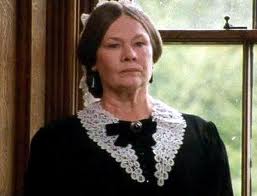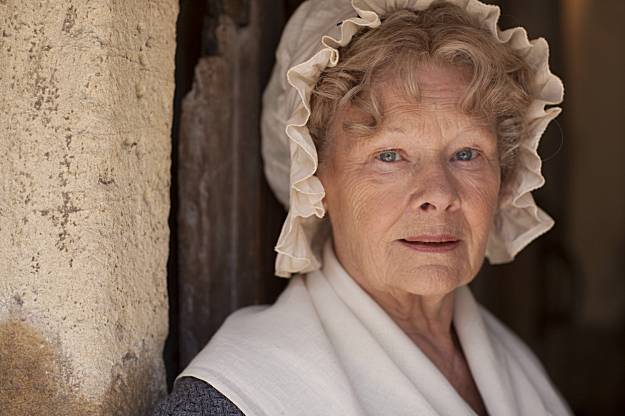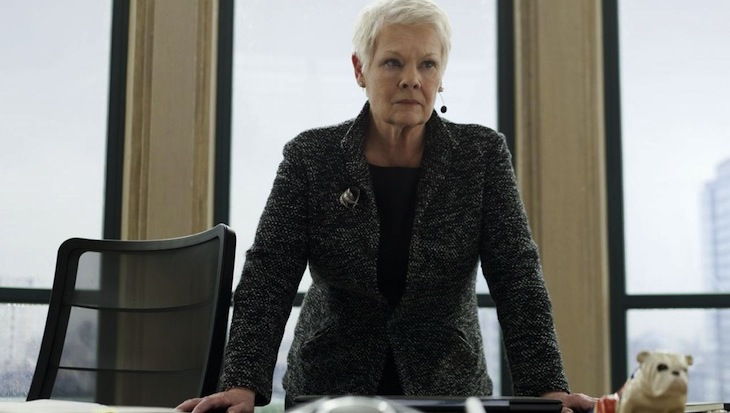
My, but it’s been a bumper few months for the Baker Street Boy. There’s been Anthony Horowitz’s superior new Holmes novel, The House of Silk, Guy Ritchie’s second instalment of his steampunk take on Sherlock as karate-kicking action hero, and now the return of the BBC’s stylish reboot of Holmes as a new millennium net 'tec. And what a lot of fun it was.

On Easter Monday, as the sun came down over the sea, a crowd of 15,000 – it’s not quite right to call them theatre-goers – followed Michael Sheen as he dragged a cross to Port Talbot’s own version of Golgotha, a traffic island hard by Parc Hollywood. The culmination of a three-day epic, The Passion of Port Talbot was street storytelling at its most transformative. The cast of thousands, including local am drammers and the Manic Street Preachers, were dragooned by WildWorks, National Theatre Wales and, above all, Sheen, whose year this was.

In a year of mounting turmoil and uncertainty, it was easy to fall back on safe bets and comfort-zone reassurance. Addictive TV series offered a welcome haven from the angst of financial meltdown: Sarah Lund’s melancholy airs in The Killing offered a homeopathic cure for the gloom of double-dip recession. Breaking Bad, the saga of the cancer-struck physics teacher who takes to a life of crime was dark, funny and endlessly surprising. Downton Abbey, by way of a contrast, was well made and watchable, in a warmly soporific kind of way.

My Top 10 movies of 2011, in order, are: Mysteries of Lisbon, Melancholia, Meek’s Cutoff, A Dangerous Method, Aurora, Hugo, The Princess of Montpensier, City of Life and Death, The Descendants, Midnight in Paris.

It's interesting to consider at what point in someone's career does he or she become a national treasure - as Alan Bennett once so scathingly remarked, “If you live to be 90 in England and can still eat a boiled egg they think you deserve the Nobel prize” - but there can surely be no debate about whether Dame Judi Dench deserves her status.
Geoffrey Palmer said of his co-star for several years on the BBC sitcom As Time Goes By, “She's everything that everyone says about her” - and what they had to say about her in Charlie Stuart's The Many Faces of Dame Judi Dench was overwhelmingly nice; she's a joy to work with, a stellar presence on screen and stage, and a jolly presence in the rehearsal room.
The film was an enjoyable, if undemanding run-through of Dame Judi's career and, although billed as a documentary, there was little by way of personal biography. For the record, she was born into a Quaker family in York in 1934 and made her professional debut in 1957 with the Old Vic Company and hasn't stopped working since. Palmer was among a long list of talking heads who included Michael Parkinson, Ronald Pickup and Simon Callow, and a smattering of critics, but she was noticeably absent from the programme, and the clips perforce were mostly of her television work and some recent films.
Much was made of her wide range of credits as one might expect from an actress with an extensive and varied CV. Palmer, an old friend who made some drily mocking contributions, explained, “She just likes working, so if someone offers her a job, she takes it. She’s crazy."
 She has always, we learnt, moved with ease between stage, television and film, and - unusually for an acclaimed serious actor of her generation – has done as much popular entertainment as she has highbrow work, in a career dripping with awards, including an Oscar. Her longevity means that each generation discovers her for themselves; for many, she's the definitive Lady Macbeth (in Trevor Nunn's 1976 RSC production), or Sally Bowles (in the first London production of Cabaret in 1968), or Queen Victoria (in John Madden's film Mrs Brown, pictured right).
She has always, we learnt, moved with ease between stage, television and film, and - unusually for an acclaimed serious actor of her generation – has done as much popular entertainment as she has highbrow work, in a career dripping with awards, including an Oscar. Her longevity means that each generation discovers her for themselves; for many, she's the definitive Lady Macbeth (in Trevor Nunn's 1976 RSC production), or Sally Bowles (in the first London production of Cabaret in 1968), or Queen Victoria (in John Madden's film Mrs Brown, pictured right).
To a huge number of TV viewers she will be known as the kindhearted Miss Matty in Cranford (pictured below), and to filmgoers for a heartbreaking study of the novelist Iris Murdoch descending into the hell of dementia in Iris (2001), or as the positively evil Barbara Covett tormenting fellow teacher Cate Blanchett in Notes on a Scandal (2006). For me her definitive role was Titania played as Gloriana in Peter Hall's magnificent production of A Midsummer's Night's Dream in 2010. It was, simply, awesome.
Despite being made in DBE in 1988, Dame Judi's fame was confined to these shores until a trio of roles in films released in three years – M in Goldeneye (1995), Queen Victoria in Mrs Brown (1997) and Queen Elizabeth I in Shakespeare in Love (1998) – gave her worldwide stardom. As her Goldeneye co-star Samantha Bond remarked, Dame Judi become an overnight success in her sixties in the United States and some American journalists, unfamiliar with her extensive CV, innocently asked what she had been doing before M. Dame Judi had been offered Broadway roles when she was younger, but decided to stay put in Britain to look after her beloved husband, the late Michael Williams (her co-star in the BBC sitcom A Fine Romance) and their daughter Finty Williams, herself now an actress.
 Much of Dame Judi's popularity, I suspect, comes from the fact that lots of TV viewers know her as a notorious corpser from her appearances on bloopers shows down the years - “We did have the odd retake...” attested Palmer - while director Sally Potter talked about the “weeping levels of hilarity” during the making of her film Rage (2009), when a young man had to be drafted in to tutor the dame in the art of smoking a spliff.
Much of Dame Judi's popularity, I suspect, comes from the fact that lots of TV viewers know her as a notorious corpser from her appearances on bloopers shows down the years - “We did have the odd retake...” attested Palmer - while director Sally Potter talked about the “weeping levels of hilarity” during the making of her film Rage (2009), when a young man had to be drafted in to tutor the dame in the art of smoking a spliff.
Others may quibble with Dame Judi's recently elected status in a trade newspaper as the greatest stage actress of all time – surely an impossible thing to judge, and one that I suspect she herself would bat off as silly – but as this programme showed, she is head and shoulders above her peers in the breadth of her roles. She's done everything from Shakespeare to Sondheim, sitcom to Z-Cars and Bond to Brecht. And even at an age where others might be retiring she is still taking on demanding and boundary-pushing work, such as her role in the experimental film Rage.
This was decent trot through an interesting and full career, and it was fun to see some footage of Dame Judi as a young actress. But ultimately her absence meant that the film lacked any meaningful analysis of her work.
DAME JUDI DENCH ON THEARTSDESK
A Midsummer Night's Dream, Rose Theatre (2010). Judi Dench is a glorious Gloriana in Peter Hall's flat production
Jane Eyre (2011). Dench plays kindly housekeeper to Mr Rochester in invigorating version of the novel with Michael Fassbender and Mia Wasikowska
Skyfall (2012). Dench's M (pictured) is written out of the franchise in possibly the best ever Bond movie
The Best Exotic Marigold Hotel (2012). The Dames have it in John Madden's tale of British travellers abroad
 J. Edgar (2012). Dench as Hoover's mother lacks commitment to her American accent in flawed Eastwood biopic
J. Edgar (2012). Dench as Hoover's mother lacks commitment to her American accent in flawed Eastwood biopic
Philomena (2013). Judi Dench touches the heart once again in the Dame's latest bid for Oscar glory
Peter and Alice, Noël Coward Theatre (2013). Judi Dench and Ben Whishaw step through the looking glass in Michael Grandage's elegiac production of John Logan's new play
Spectre (2015). Dench's M cameos in a video message beyond the grave as Daniel Craig and Sam Mendes carry on without her
The Second Best Exotic Marigold Hotel (2015). The expats are back in that rare sequel that betters its predecessor
The Winter's Tale, Garrick Theatre (2015). Judi Dench brings gravitas to Kenneth Branagh's West End season opener
The Hollow Crown: The Wars of the Roses - Richard III (2016). Dench is a matchless veteran opposite Benedict Cumberbatch chills's crook-backed king
Overleaf: watch Judi Dench as Lady Macbeth in Trevor Nunn's 1976 RSC production of Macbeth

I have always fought hard to resist nostalgia, but 2011 was the year when I succumbed. Maybe the present – and the future – was just too awful to contemplate, but I found myself constantly looking back. Whether it was onstage, onscreen or on a hand-held device the past seemed to provide the requisite cultural comfort food. Dessau Towers remains a dubstep-free zone.

We have, thankfully, long since moved beyond the point where there's any need to delineate or categorise works of art according to gender. However, looking back at 2011 it's hard to escape the conclusion that the most compelling music emerged from the mouths and minds of women.

I love the idea of Armstrong & Miller. Alexander Armstrong has his odious toff routine off to a tee, the clubbable rotter who'll cheat at golf, get you to pay for all the whisky sours in the clubhouse, and then shag your wife. Alongside, Ben Miller exists in a cloud of brainy abstraction, convinced that his serial bungling failures are merely the prelude to roaring success.

Without wanting to sound humbuggy, do we really need another Great Expectations? Let alone two. There’s yet another movie coming next year but breasting the tape first is a new three-parter from the BBC. Cinema last visited the story of Pip Pirrip in 1998 when Alfonso Cuarón transplanted the novel to present-day New York. On television Tony Marchant had a go a year later. Theatre was there even more recently with Declan Donnellan's staging for the RSC in 2005 and Watford Palace's Asian version earlier this year.

